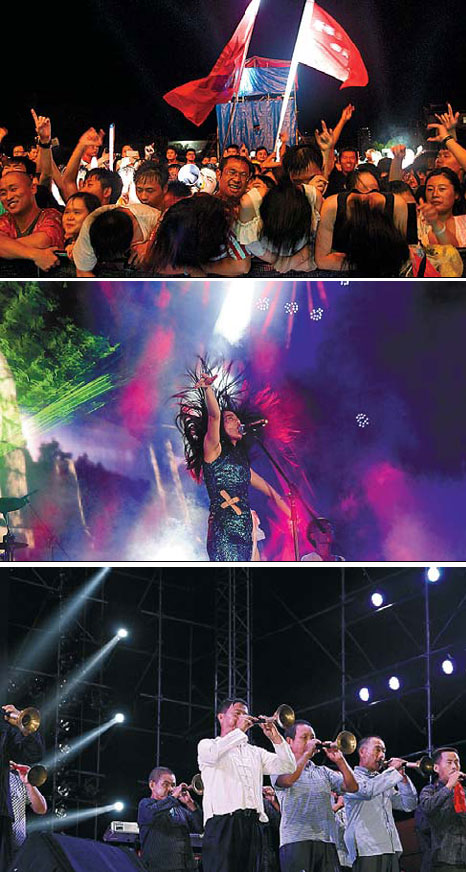Music festivals find enthusiastic crowds in smaller cities
Updated: 2013-09-06 07:19
(China Daily)
|
||||||||
Comment | Mu Qian
A choir of boatmen from Hunan province sings rhythmic verses to accompany the towing of a boat. Their voices hit notes much higher than those of tenors in Western bel canto singing.
Next on stage is a death metal band from Guizhou, whose female lead singer hits the guitarist while bellowing in agony, before diving into the crowd.
It's an unusual combination, but this was the scene at the Border Town Music Festival in Fenghuang, western Hunan province. One of the two stages was reserved for music from the local area, traditional and contemporary.
Bordering Guizhou province and near Chongqing and Sichuan province, Fenghuang county and its surrounding area is dominated by ethnic groups, such as the Miao and Tujia peoples.
Musicians from these ethnic groups were given opportunities to perform on the festival's local stage, while the major stage featured bands that are well known across the country.
|
Young people are thrilled by the live performances of the Border Town Music Festival in Fenghuang, Hunan province. Musicians from local ethnic groups perform on the festival's local stage, while the major stage features bands that are well known across the country. Photos by Wang Yan / For China Daily |
This is the first time I have seen such a juxtaposition at a music festival. The two stages formed an interesting contrast, as musicians not from the area got to see local acts, while local musicians had the chance to watch and learn from professional bands.
China's pioneer rock musician Cui Jian named his first album and national tour "Rock 'n' Roll on the New Long March", as he sees his work as preaching rock music in the country. It seems that the flourishing music festivals across China have taken on this task in a more thorough way, bringing rock music to places like Fenghuang, a county that has never before seen a music festival.
Aiming at "building China's first roots music brand", the festival selects mostly musicians with Chinese influences, such as Xie Tianxiao, who plays a guzheng zither alongside his electric guitar, and Su Yang, who adapts northwestern Chinese folk songs into contemporary form.
"For Fenghuang, the hometown of people such as writer Shen Congwen and artist Huang Yongyu, what kind of music festival will suit it?" says Zhao Muyang, artistic director of the festival. "We decided to feature rock music with Chinese roots, and at the same time present the local music."
The Fenghuang Border Town Music Festival attracted the town's fun-loving young people. They were a wildly enthusiastic crowd, welcoming anything that was played. If you gave them some rhythm, they went crazy. Even some bands that would have been likely to receive boos in Beijing received storming applause in Fenghuang.
I can feel the audience's excitement. County-level cultural life in China usually offers little more than singing karaoke and playing pool. The three-day festival was a carnival for the locals. For the first time, they could enjoy an outdoor music festival and see live performances, just like people in big cities. The audience screamed, sang, danced and splashed beer to celebrate the festival.
It is counties like Fenghuang, rather than the metropolises of Beijing and Shanghai, that remind me of the big market for music festivals in China.
China has nearly 2,000 counties. Even if only one out of every 10 counties hosts a music festival, there will be nearly 200. Properly developed, this market could contribute greatly to China's economy as well as its musical life.
For tourists from outside of Fenghuang, the festival was a good opportunity to understand local lives.
Fenghuang is a popular tourist destination, thanks to its well-preserved old town with unique architecture and the Miao culture. But like all other Chinese old towns, nowadays you can see nothing original in the town. All locals have moved out of the old town and rented their houses to businessmen who do not live there. Everything you see is catered to tourists.
If you are not satisfied with Shen Congwen's description of Fenghuang in the early 20th century, and what the souvenir shops offer, you can see what Fenghuang people are really like at the music festival.
Contact the writer at muqian@chinadaily.com.cn.
(China Daily USA 09/06/2013 page17)
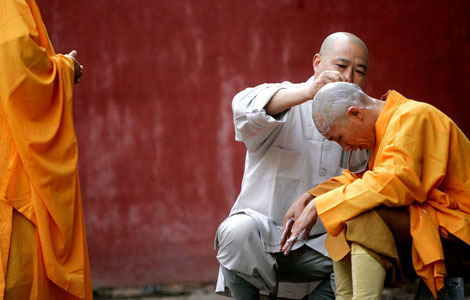
 Rare look in Shaolin temple
Rare look in Shaolin temple
 Last photos of Hungarian wingsuit diver
Last photos of Hungarian wingsuit diver
 In photos: Typhoon Fitow aftermath
In photos: Typhoon Fitow aftermath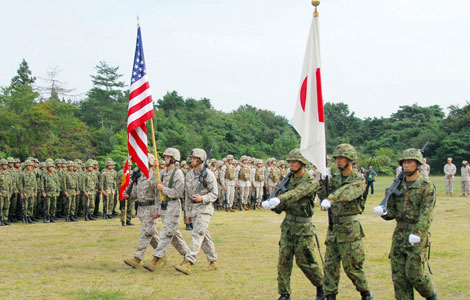
 Japan-US military drill raises tension
Japan-US military drill raises tension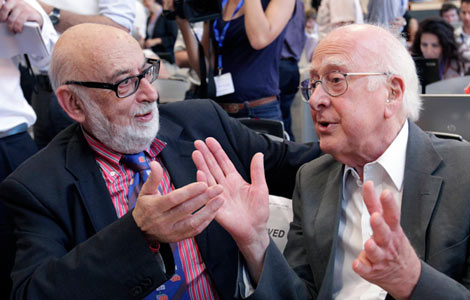
 Higgs and Englert win physics Nobel prize
Higgs and Englert win physics Nobel prize In Bali, they relax in local fashions
In Bali, they relax in local fashions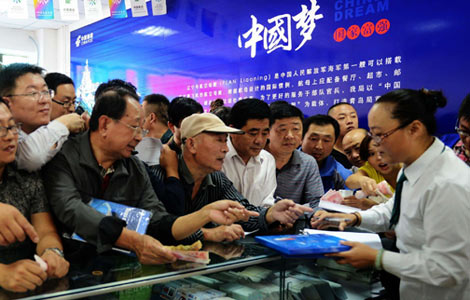
 Post office for Liaoning carrier opens
Post office for Liaoning carrier opens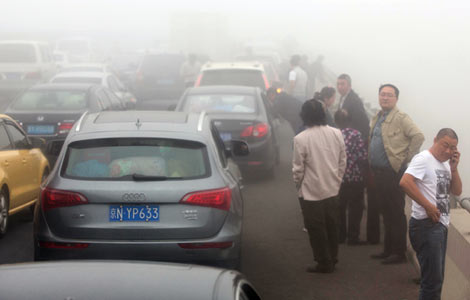
 A smog-filled Beijing targets polluting cars
A smog-filled Beijing targets polluting cars
Most Viewed
Editor's Picks
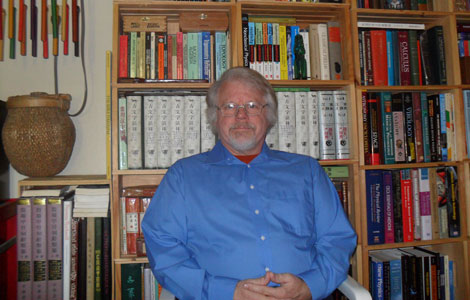
|

|

|

|

|

|
Today's Top News
China predicted to be largest tourist market for US
Peace is in China's DNA: says ambassador
Xiaomi's Barra ready to take on Beijing
A day of cultural exchange at Pace University
ZTE, Houston Rockets shooting for global markets
Global firms facing HR challenges in Asia
Shops court Chinese with Mandarin
Back to 1942, entered for the 86th Oscars
US Weekly

|

|
